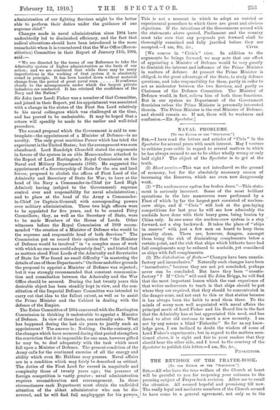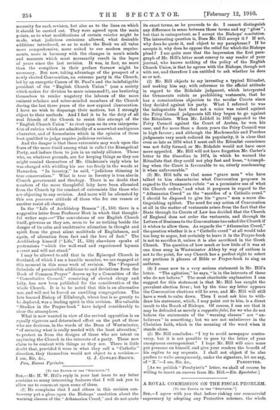THE REVISION OF THE PRAYER-BOOK.
[To TUE EDITOR 07 THE "SPECTATOR."]
who have the true welfare of the Church at heart will be grateful to you for reopening your columns to the pressing subject of Prayer-book revision. Allow me to recall the situation. All seemed hopeful and promising till now. The really loyal and moderate members of the Church seemed to have come to a general agreement, not only as to the necessity for such revision, but also as to the lines on which it should be carried out. They were agreed upon the main points, as to what modifications of certain rubrics might be wide, what judicious omissions allowed, what desirable additions introduced, so as to make the Book we all value more comprehensive, more suited to our modern require- ments, more in harmony with the changes in men's minds and manners which must necessarily result in the lapse of years since the last revision. It was, in fact, no more than the compilers in their preface foresaw might be necessary. But now, taking advantage of the prospect of a newly elected Convocation, an extreme party in the Church, led by an energetic Canon of St. Paul's and the indefatigable president of the "English Church Union" (can a society which makes for division be more misnamed P), are bestirring themselves to render nugatory the labours of the more eminent scholars and sober-minded members of the Church during the last three years of the now expired Convocation.
I have no wish to disparage their motives, but I strongly object to their methods. And I feel it to be the duty of all real friends of the Church to resist this attempt of the "English Church Union" to rivet upon us its own interpreta- tion of rubrics which are admittedly of a somewhat ambiguous character, and of formularies which in the opinion of those best qualified to judge require judicious revision.
And the danger is that these extremists may work upon the fears of the more timid among what is called the Evangelical Party, and induce them to join in an unholy alliance. Those who, on whatever grounds, are for keeping things as they are might remind themselves of Mr. Gladstone's reply when he was charged with wielding his axe too freely in the woods at Hawarden. " In forestry," he said, " judicious thinning is true conservatism." What is true in forestry is true also in Church government and theology. There is no doubt that numbers of the more thoughtful laity have been alienated from the Church by the conduct of extremists like those who are objecting to any revision. And more will be alienated by this non possumus attitude of those who for one reason or another resist all change.
In the " Life of Archbishop Benson" (I., 150) there is a suggestive letter from Professor Hort in which that thought- ful writer says The convulsions of our English Church itself, grievous as they are, seem to be as nothing beside the danger of its calm and unobtrusive alienation in thought and spirit from the great silent multitude of Englishmen, and again, of alienation from fact and the love of fact." The Archbishop himself (" Life," II., 538) elsewhere speaks of pretensions " which the well-read and experienced layman c.ianot and will not stand."
I may be allowed to add that in the Episcopal Church in Scotland, of which I am a humble member, we are engaged at this moment in this same work of revision. The "Proposed Schedule of permissible additions to and deviations from the Book of Common Prayer" drawn up by a Committee of the " Consultative Council," consisting of elected clergy and laity, has now been published for the consideration of the whole Church. It is to be noted that this is an alternative use, and will not be forced on unwilling congregations. The late learned Bishop of Edinburgh, whose loss is so greatly to be deplored, was a leading spirit in this revision. His valuable " Studies in the Prayer-book " have helped considerably to clear the atmosphere.
What is now wanted in view of the revived opposition is an equally vigorous and determined effort on the part of those who are desirous, in the words of the Dean of Westminster, "of securing what is really needed with the least alteration," to protect us from the designs of those who are intent on capturing the Church in the interests of a party. These now claim to be content with things as they are. There is little doubt that, provided it were in what they call a "Catholic" direction, they themselves would not object to a revision.—











































 Previous page
Previous page